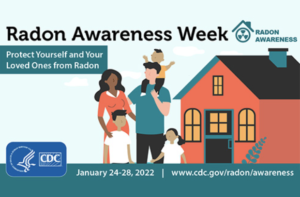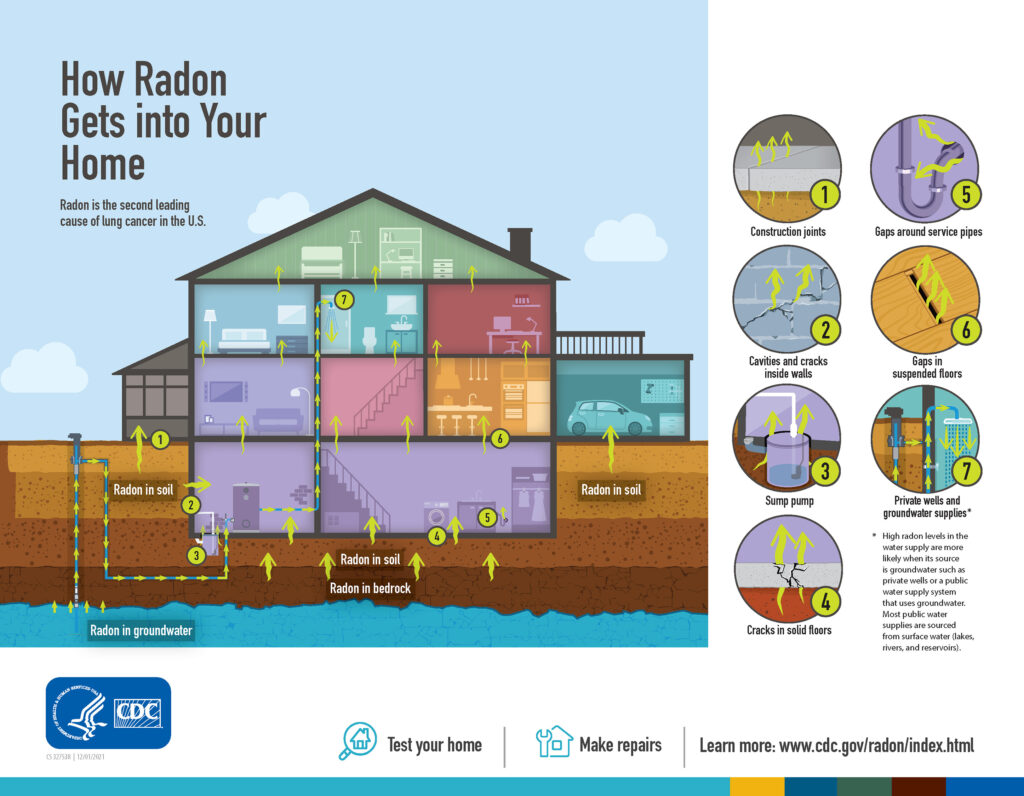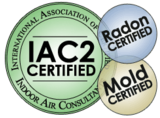
Radon is estimated to cause around 21,000 lung cancer deaths in the United States every year and is the second leading cause of lung cancer, according to the U.S Environmental Protection Agency (EPA). Radon is a naturally occurring radioactive gas that can get trapped in homes and buildings and expose the people who live and work inside, increasing their risk of developing lung cancer later in life. This risk is even higher among those who smoke cigarettes.
The good news is that exposures to high levels of radon are preventable. CDC’s 2022 Radon Awareness Week, observed on January 24-28, raises awareness about risks and encourages prevention by highlighting a different topic each day of the week
Monday
Radon is an odorless and invisible radioactive gas released from rocks, soil, and water. Radon can get into your home and build up. Over time breathing in high radon levels can cause lung cancer. Learn more: https://bit.ly/2S9itPTexternal icon
Radon is an odorless and invisible radioactive gas that can get into your home. Test your home for radon and take actions to reduce high radon levels to prevent lung cancer.
Tuesday
Radon causes about 21,000 lung cancer deaths each year, according to the #EPA. Smoking & radon exposure increases the risk of lung cancer. Call 1-800-QUIT-NOW for help quitting smoking. Lower radon risks: https://bit.ly/3wIlDZKexternal icon
After smoking, #radon is the second leading cause of lung cancer in the United States. Nearly 1 out of 15 homes has high radon levels.
Wednesday
Any home, new or old, in any state, can have high levels of radon. Radon can cause lung cancer. Check out data on testing and radon levels for most states: https://bit.ly/3CjMrSbexternal icon
Your home could have high levels of radon, putting you and your family at risk for lung cancer. Contact your state radiation control program for resources on testing and radon reduction: https://bit.ly/3qIyTNSexternal icon
Thursday
Radon is a natural gas that can build up inside any building and can cause lung cancer. The Environmental Protection Agency (EPA) recommends testing all schools for radon. Learn more: https://bit.ly/3kKVFAXexternal icon
Teachers can educate kids about #radon with resources from the #EPA. Kids can take home what they learn and may even help protect their families from lung cancer. https://bit.ly/3wQH77Eexternal icon
Friday
Healthcare providers: Ask if your patients have tested their homes for radon and share information about the risks and prevention. View new guidance for healthcare providers from the Conference of Radiation Control Program Directors: https://bit.ly/3CjD84Fexternal icon
Healthcare providers: Radon can cause lung cancer in anyone. If your patient smokes, it is even more important to make sure they are aware of the risks of #radon. Provide your patients with information. https://bit.ly/3CjD84Fexternal icon

Keep an eye out for other resources and activities in observance of Radon Awareness Week and subscribe here to the Radiation and Health Newsletter.

